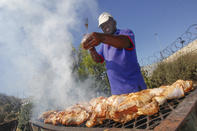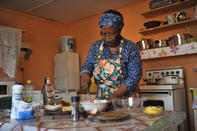Nutritional Transition
How we use food is deeply rooted in our cultural attitudes towards it. If we can understand what shapes our views on food, we can better address whether or not people choose healthier foods or not. We would be naive to think that simply giving people healthy foods will be reason enough for them to want to eat it.

Moving to the city can be like a tectonic force in terms of how it changes our perceptions of food. This is part of what’s become known as the ‘nutritional transition’.
Across the developing world, the ‘nutritional transition’ happens as people move to cities, get sucked into the job market, and are exposed to this so-called ‘Western diet’ that is less diverse, lower in fibre, energy-dense and often nutritionally worthless. People often want branded, highly processed or fast food because it’s perceived to be sophisticated and modern, a perception driven by the aggressive marketing of big-name fast and processed food companies and labels.
Modern, urban life often makes a ‘slow food’ approach to eating difficult. Urban life steers us towards food that is quick to get hold of (no more hours of slaving over the stove), tasty (packed with sugars, fats, and salts that tickle the pleasure centre in the brain) and cheap (factory production lines bring down the cost).
Return to ‘Real’ Food

A survey done in Johannesburg by academics from the School of Public Health at the University of the Western Cape for the United Nations’ Food and Agriculture Organisation (FAO), found that some people preferred fried food because it is seen as a mark of ‘modern living and wealth, while food that is boiled is considered inferior and demonstrates outdated customs’.
For many, eating meat is seen as aspirational. Tony Gerrans from Compassion in World Farming says that the attitudes he has encountered in Afrikaans communities are often that hunting, braaiing and eating meat are associated with masculinity. Abalimi’s Rob Small says that in Xhosa-speaking communities, those who slaughter animals have a spiritual role.
Besides just these cultural attitudes towards food, urban life has torn us from the home kitchen and scattered us about a busy and bustling cityscape, which has disrupted traditional ways of communing over food.
The FAO study says that: ‘Traditional meals and mealtimes are replaced by spontaneous often unplanned food purchases on street corners or in small kiosks. The traditional model of one family member taking responsibility for meal planning and food preparation for the household has fractured in most urban environments. Increasingly it is street food vendors, cafeterias at work or school and childcare facilities that provide family members with at least one and often several meals per day. Thus, attention to dietary balance and dietary quality, which was traditionally ‘intuitive’ at the household level, is now subject to wider cultural changes and external influence.’
If we hope to encourage people and communities to return to ‘real’ food, and to grow their own, we need to turn the tide on many of the attitudes that see growing vegetables as ‘old fashioned’ or something that ‘our grandparents did.’